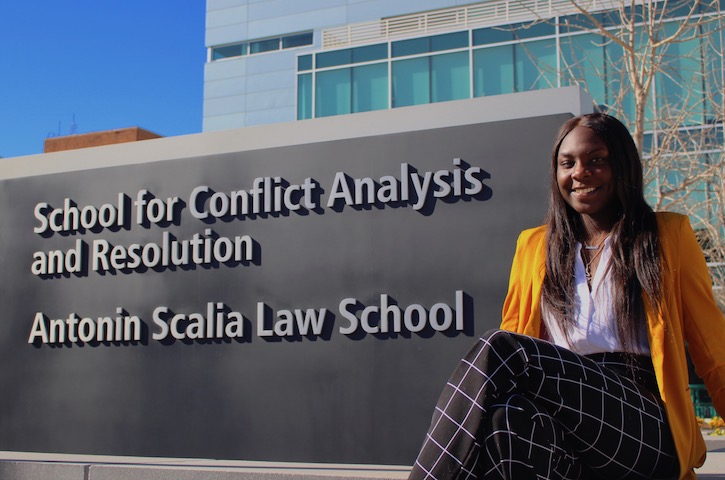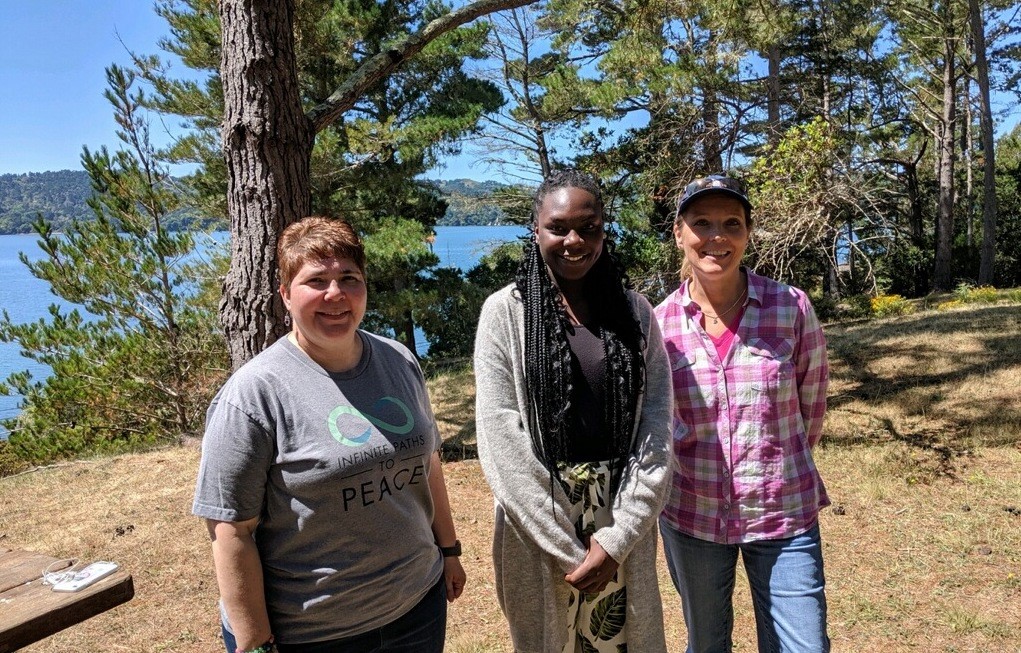
Following her graduation in 2019 with a bachelor's degree from the School for Conflict Analysis and Resolution, Oumou Ly received a Shinnyo Fellowship to work on health equity with the D.C. Primary Care Association. (Photo credit: Audrey Williams)
In the spring of 2019, like many of her fellow soon-to-be graduates, George Mason University student Oumou Ly spent her time laying plans to put her new credentials—a B.S. in Conflict Analysis and Resolution and a minor in Sociology—into action.
Following her studies at the School for Conflict Analysis and Resolution (soon to be the Jimmy and Rosalynn Carter School for Peace and Conflict Resolution), Ly was prepared to enter a career in international development.
Then, at the eleventh hour, an internship with a lobbying firm in Washington, D.C., introduced a new interest: public health and health inequity.
Her internship, organized as part of the Peacebuilding Fellows program at S-CAR, gave her the opportunity to work on a wide variety of issue areas, but her curiosity was never more piqued than when healthcare legislation came across her desk.
“While I was in Peacebuilding Fellows, there were overlapping disparities that I was seeing [in the course material], and I kept going back to health and health equity,” Ly said.
To pursue this new interest, Ly set out to apply for the Shinnyo Fellowship, which is awarded each year by the Shinnyo-en Foundation to recent graduates from select partner universities, including George Mason University, to support their work with service-minded organizations.
Undergrads: Apply for the Shinnyo Fellowship by April 20.
As part of her application, Ly was prompted to reflect upon her own personal definition of peace. She began floating the idea of a connection between public health and peacebuilding in her Peacebuilding Fellows classes, and the encouragement of her peers helped solidify her resolve to explore this intersection in her application.
“[Healthcare] affects everyone,” Ly said. “Marginalized or not, you have to deal with the healthcare system at some point in time.”
The connection between peace and health equity was not lost on the Shinnyo-en Foundation. Ly was selected to join the fellowship’s 2019–20 cohort, and since September of last year, she has been part of the policy team at the District of Columbia Primary Care Association (DCPCA) in Washington, D.C.

The Shinnyo-en Foundation sponsors the participation of the Shinnyo Fellows and their mentors at the Fellows Summer Orientation and Annual Retreat in August. Oumou Ly, George Mason University's Shinnyo Fellow for 2019–20, was joined at the 2019 retreat in California by S-CAR staff members Lisa Shaw (left) and Jane Walker (right).
Her work at DCPCA has focused on maternal health, food security, and facilitating connections between the “larger coalition of clinical and social service organizations” in the District that are working to address the health needs of D.C. residents by supporting not just better healthcare but also a greater understanding of the “social determinants of health.”
“Basically, you can't look at health as one factor,” Ly said. “You have to look at housing, transportation, food, and kind of implement that into a person-centered healthcare system.”
The majority of her work focuses on addressing how inequalities in the social determinants of health and the healthcare system impact marginalized communities in D.C., particularly communities of color.
The inequalities are most dire in Ward 7 and Ward 8, both of which are 92 percent black or African American.
According to reporting by Julia Craven in Slate, these two wards “have the lowest number of pharmacies and the slowest ambulance response times.” There is only one nearby hospital, United Medical Center, for communities in these wards, and it has a history of lacking essential services, such as a trauma center and a maternity ward.
The latter in particular has been a major issue faced by the individuals with whom Ly works as part of her maternal health portfolio. She notes that they have to travel to different wards to give birth, and they often experience additional vulnerabilities, such as “food insecurity, transportation issues, [and] mental health issues.”
These issues, among others—including the implicit bias that black patients face in the healthcare system—are implicated in D.C. being among the most dangerous places in the United States to give birth for black individuals, who experience a nationwide maternal mortality rate that is three times higher than that experienced by white individuals.
The disparities that Ly and her colleagues have been working to address in areas like maternal health are also an undeniable factor in a different sort of health crisis: the COVID-19 pandemic.
DCPCA is working to respond to the crisis by “ensuring that all patients, regardless of COVID-19 status, are still able to receive timely and quality primary and emergency care,” according to Ly. This has included facilitating patient accesses to telehealth services.
The impact of the pandemic on these communities is being compounded by long-standing inequality. Ly notes that because many of the patients with whom her organization works rely on Medicare or Medicaid, effective healthcare services are more likely to be out of reach.
“As an ‘insider’ to this public health crisis, I've gotten to see data in real time about the number of cases and D.C.'s effort to flatten the curve,” Ly said. “Poor, black, and brown people are still disproportionately affected, even in a time where the world is reacting to the same public health emergency.”
According to data being compiled by the D.C. government, 54 of the 72 D.C. residents who have died due to COVID-19 as of April 14, 2020, have been black. That number equates to 75% of the fatalities—even though black individuals make up approximately 46% of the District’s population.
The disproportionate impact of COVID-19 on communities of color and black communities in particular is being documented across the United States, from Michigan to Illinois to Louisiana.
This disparity is being attributed to many factors, from the higher prevalence and lethality of conditions such as diabetes and heart disease among black communities to the fact that black individuals are more represented in low-wage and essential industries that lack, or have not implemented, the telework and paid leave options that would allow these individuals to follow recommended social distancing guidelines by staying at home.
These multifarious factors all have one thing in common, however. They are examples of structural violence wrought by centuries of systemic racism in the United States.
According to Ly, whose bachelor’s degree included a concentration in Justice and Reconciliation, such structural violence is as much a matter of conflict—and conflict resolution—as direct violence is.
“I don't think conflict necessarily has to be violent as far as war,” she said. “It's violent because people are dying from consequences [like those] in our healthcare system.”
She noted that just because clear sides aren’t “up in arms” in situations of structural violence doesn’t mean that there aren’t “winners and losers” in these conflicts.
As such, “approaching this public health crisis from a peace and conflict resolution lens is not only important but necessary to ensure that marginalized communities are not forgotten in our response efforts,” Ly said.
That’s why she is working to incorporate what she learned as a conflict analysis and resolution student into her work at DCPCA.
She said that her experience in the school’s skill-based courses, such as those teaching program evaluation, has helped her as she tracks the progress of her projects, while her undergraduate research capstone helped prepare her for the reports she is producing as part of her fellowship.
In guiding her desire to focus on the intersection between disparity, marginalization, and conflict, Ly pointed to her Fall 2018 “Human Rights and Inequality” (CONF 394) course with Solon Simmons, an associate professor at the school, as having been particularly impactful.
During the course, “[Ly] brought a distinctive approach among the students about how social and economic inequalities can intersect with peacebuilding,” said Simmons.
He noted that Ly’s combination of both international and domestic perspectives as a first generation American—her mother immigrated with her siblings from Senegal to Maryland thirty years ago—has given her a unique ability to understand both insider and outsider viewpoints and experiences.
Simmons underlined that Ly was exemplary in her dedication not just to learning the material but also working through challenging topics with her peers.
“She is the very sort of student who makes me proud to teach in a peace and conflict program,” he said. “She has the kind of easy manner about her critical engagement that allows her to cut to the quick of a potentially divisive issue while remaining inviting, so that others can begin to reflect on their own privilege and culpability.”
For Ly, it is imperative that advocacy efforts around remedying inequality actively work to center the voices of those who actually experience the inequality.
It’s a commitment that DCPCA shares. The organization’s human-centered approach to improving health outcomes—which emphasizes the inclusion of affected communities in the development, implementation, and evaluation of health and policy interventions—has reinforced lessons that Ly learned while a student at Mason.
“Just being able to co-create with people who have gone through the problems that you're trying to fix is super important, and that's something that I've noticed throughout my time at Mason,” Ly said. “Even in conflict classes, you learn that you can't apply a blueprint to every single conflict. It's different, and context matters.”
She hopes to maintain this conflict-sensitive, human-centered advocacy orientation as she moves into the next stage of her career when her fellowship ends in July.
“Whether I'm the advocate or whether I'm uplifting people to be their own advocate, [this approach] is something that I think that I'll take on with me,” she said.
